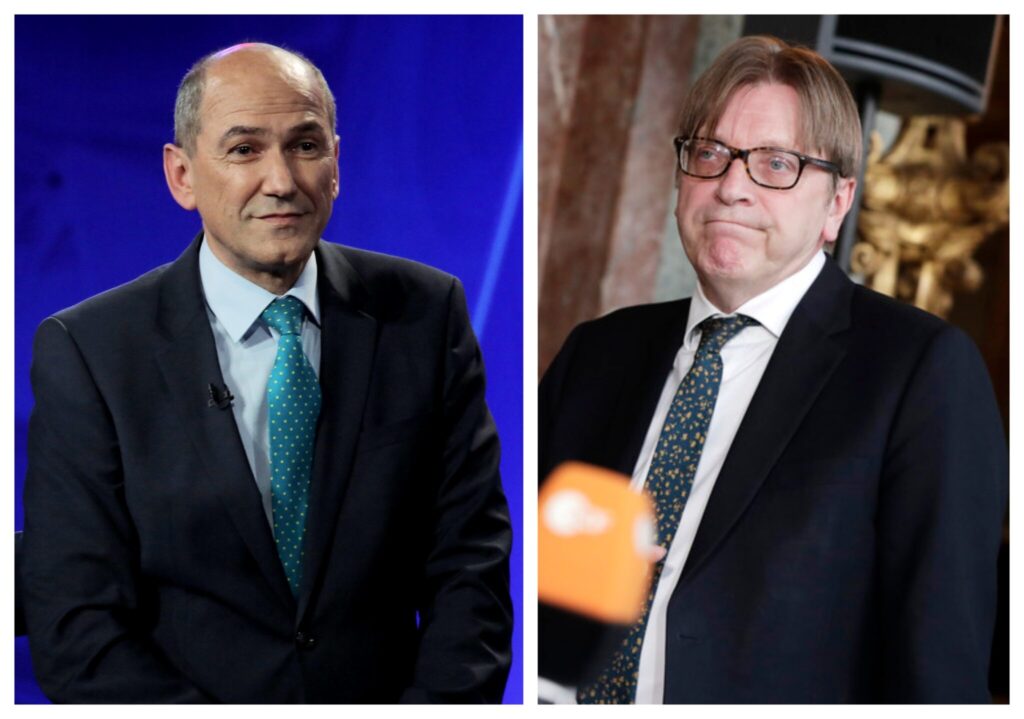Guy Verhofstadt, a Belgian MEP from the ranks of the political group Renew Europe of the European Parliament, has also turned out to be one of the people who have suddenly become very worried about the state of the media in Slovenia. After the infamous Politico article was published, accusing the Prime Minister Janez Janša of intimidating and persecuting the media that are not to his liking, Verhofstadt also expressed his concern. Despite the fact that Prime Minister Janez Janša and many Slovenian intellectuals have repeatedly explained with a series of substantiated arguments that what was written in the article is not, in fact, true, Verhofstatd is determined to not give up.
This time, Guy Verhofstadt criticised Janez Janša’s post, with which he responded to the flood of false news about the state of the media in Slovenia, writing the following: “If you repeat a lie often enough, it becomes truth journalism.” With this, Janša responded to the Kleine Zeitung, which published a worn-out joke about “Marshal Twitto.” He was also referring to what the Slovenian left is particularly bothered by – the fact that the current Prime Minister likes to bypass (their) mainstream media and prefers to communicate his thoughts directly, with the use of social networks, thus avoiding manipulation and also making himself heard.
Verhofstadt responded to Janša’s post, writing, “Janez Janša’s onslaught on free media continues.” He also called on the European Commission and the European Council to act soon, before Slovenia takes the EU presidency and becomes the third country that is as “undemocratic” as Hungary and Poland, in his opinion. Janša responded to Verhofstadt and asked him to calm down. Given that Belgium is known to be a country with a colonial past, and king Leopold II. is a ruler, famous for his bloodthirstiness due to his colonial aspirations, Janša also added: “You are not the head of a colonial power anymore. And Slovenia isn’t Congo, either.”
The post clearly upset Verhofstadt, as he wrote the following in his response: “Then stop treating it like your crown domain. Rights, freedoms and values are in the EU treaties your country signed up to, Slovenians stand by them, and they serve their interests, not yours! Leave the journalists alone, full stop!” Of course, Janša also responded to this, explaining to the MEP that Slovenians are the ones who decide about their interest, not Verhofstadt. “Stop patronising. Focus on your poor election results at home. First, you have to earn the trust of your own voters. Then lecture all others.”
According to the British Express, the name of the former Belgian Prime Minister, who has developed a fondness of criticising Janša lately, was previously mentioned in connection with the company mentioned in the Paradise Documents, which offered an insight into the world of tax evasion. Verhofstadt, who described the accusations as fake news in the purest sense of the word, has apparently now focused a lot of his attention on our country and the debate on what situation we are currently in. Shortly after Lili Bayer’s article about the alleged intimidation of journalists in Slovenia, which was published after the failed vote of no confidence, he wrote on Twitter that when a journalist asks a question about media freedom, bullying her is not the answer. He tagged Janša in his post and added that the European Union needs to defend the freedom of the press and critical journalism now more than ever. “As a member of the European Council, you should set an example!” he also wrote to Janša, who responded to the MEP’s tweet and wrote that the government had answered all of Bayer’s questions, but Politico ignored their answers. “Who is bullying who?”
Even if Verhofstadt does not particularly like Janša, he could have at least read a few arguments written by Slovenian intellectuals, and he would quickly be able to see that in Bayer’s case, it is more a matter of imaginative writing than stating actual facts. As explained by sociologist and dean of the School of Advanced Social Studies, Borut Rončević, Ph.D., the picture of the state of media freedom in Slovenia that Bayer painted is completely wrong. “The reason that the picture is wrong is that the journalist did not do her journalistic work correctly,” he pointed out and added that he would not even call her work journalistic, as it resembles activism and political agitation much more. In addition to not taking into account any of the systematic records, meaning the relevant scientific research or reviews of the media space in Slovenia, it is also problematic that it is not clear who she spoke to, and the article also did not include a response from the government, which she did, in fact, receive.
It would undoubtedly be appropriate for Verhofstadt to look at the results of a recent survey on the media landscape in Slovenia before getting involved in any disputes. That way, he would be able to clearly see that the public media, which is expected to be impartial, stands out because of its bias, while the political and ideological note of the other central media is also evident and clearly recognisable. The left-wing views are clearly predominant over the right-wing ones. Those with by far the greatest reach of daily readers often express the anti-government views and are clearly very much in favour of the current left-wing opposition parties. And that is the reason why it is difficult to speak in a serious way about the repression of the media in Slovenia.
Nina Žoher


